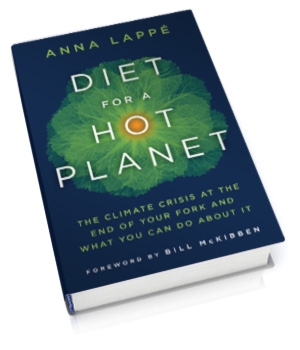Review of “Diet for a Hot Planet”
Written over 45 years ago, Frances Moore Lappé’s book, Diet for a Small Planet, revolutionized the way we think about food. As a follow up to her book, her daughter, Anna Lappé, wrote a book that puts food at the center of the climate crisis. Our food system is responsible for 1/3 of all greenhouse gas emissions. In Diet for a Hot Planet, Lappé shows that such statistics are just a tip of the melting iceberg.
 Lappé’s book is dense, thorough, and intersectional in showing how deeply our food system affects the environment. Where she finds great hope is the food at the end of your fork. Changing our individual practices around food hold out great possibility for changing our world. By being more intentional about local and organic choices around food, we can create a demand for sustainable food choices which go to the very fabric of our communities. (Bill McKibben writes the foreword to the book and relates that ten times more conversations happen at farmers’ markets than at our local grocery stories.)
Lappé’s book is dense, thorough, and intersectional in showing how deeply our food system affects the environment. Where she finds great hope is the food at the end of your fork. Changing our individual practices around food hold out great possibility for changing our world. By being more intentional about local and organic choices around food, we can create a demand for sustainable food choices which go to the very fabric of our communities. (Bill McKibben writes the foreword to the book and relates that ten times more conversations happen at farmers’ markets than at our local grocery stories.)
Lappé does not stop there. She advocates for system-wide changes to our agricultural policies which at present largely fund chemical agriculture and large agribusiness. With the help of a United Nations report on food, Lappé undoes the logic that only chemical agriculture and big ag will feed the world. The diversity and abundance found on small, local, organic farms hold the possibility for greater democracy, less use of fossil fuels and chemicals to get food to market, and a renewal of soil and land that will continue to make the planet sustainable and resilient.
Because the book is thick with analysis and Lappé’s own intellectual rigor, it is not an easy read. Some of the ways we are deeply embedded with an unhealthy food system for our planet can be downright depressing. (A more hopeful book and easier read is Hope’s Edge: The Next Diet for a Small Planet which Anna wrote with her mother and which presents sustainable food models found around the planet.) In her thorough work with this topic, however, Lappé convinces the reader that though the challenge is significant, we have a powerful way to make a difference through our personal diet, the ways we build our communities, and the transformation of our agricultural policy.
The Rev. Michael Mulberry is the Senior Minister at Billings First Congregational Church in Billings, Montana.
Related News
Growing Weary
In December 1964 during a speech in Harlem, Fannie Lou Hamer declared: “And you can always...
Read MoreOur Moral Center
“We've got about 350,000 people who are dying prematurely from the burning of fossil fuels...
Read MoreChapter Resources
Check out the latest resources for our local Climate Hope Affiliates: December Monthly...
Read More

